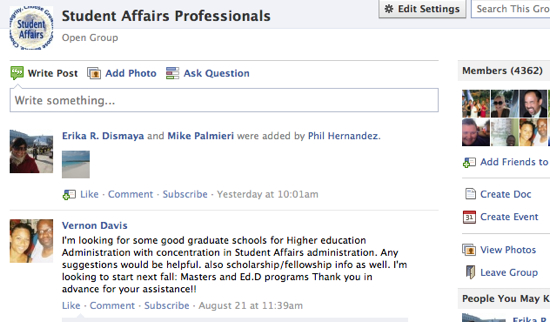“Should I, as an academic professional in higher education, have an online social networking account?” Yes, and here is why and how.
The phenomenon of Myspace and Facebook snuck up on us like a freight train with a silent running motor. In just 4 years, social networking sites grew to over 300 million accounts with 93% of all college students using them and 63% logging in every day. With numbers like that, it’s dangerous to turn our backs and pretend these sites will go away like the pet rock, big hair, or the Y2K bug.
Many academic professionals already have accounts and see the benefits for themselves and their career.
For example, Facebook has several public groups directly related to student affairs professionals:
– Student Affairs Professionals Unite (2,300+ Members)
– Student Affairs (1,025+ Members)
– Student Affairs Professionals (1,376+ Members)

These groups are a database of collective knowledge from student affairs professionals around the country. The group’s participants share and discuss real campus issues, such as:
– Marketing Ideas
– Low Cost Programming Ideas
– Residence Hall Research
– Black History Month Ideas
This technology allows us to connect and share information in ways we never could in the past. So from a career standpoint, a great value exists in using social networking sites to connect with other SA professionals.
Now, what about 93% of your students using these sites?
Part of the job of student affairs is to increase student engagement on campus. To increase engagement we have to increase our relevancy to them and their world. We have to keep up with the world they live in. We understand our world, but how well do we understand their world?

To remain relevant to today’s students, we have to engage ourselves in their world, and that means having a social networking account. However, having an account comes with rules of engagement.
The Rules of Engagement:
1) Facebook – Create a Facebook account, don’t worry about Myspace. Wired magazine predicts that Myspace will splinter this year, and more importantly the majority of 17-25 year olds prefer Facebook.
2) Understand Your Purpose – Facebook is a social environment first, an academic environment second, or maybe even fourth or fifth. The worst thing you can do is create an account and then post messages to all your students about work related activities. This is equivalent to going to a party and bringing an Excel sheet with the school’s budget. Your primary purpose should be to connect with your students. Work will become a byproduct, as I will explain later.
3) Friendships – Don’t feel offended if you are not immediately bombarded with friend requests from all the students you work with. Don’t feel hurt if some students who you request to be their friend politely decline. It’s nothing against you personally, some students prefer not to open up their entire world to your position in the institution and you should respect that. It’s that kind of privacy filtering that also keeps them safe on the Internet.
Think about their Facebook account as their dorm room and understand that some would not feel comfortable having you hanging out on their couch. Seek out those that you have a pre-existing relationship with and friend them first, then let the more distant acquaintances friend you at their discretion.
4) “Poking” – If someone “pokes” you as friends, it’s proper Facebook etiquette to “poke” them back.
5) Profiles – You have every right to share as much or as little about yourself as you want. Just remember you are still their advisor and it might be awkward for a student to read about how their advisor has a passion for European nude beaches. You are also still an employee and representative of your school or university.
That said, don’t expect your students to have the same discretion as you do. Their profiles may be filled with info that makes you want to cringe. The reason for their lack of awareness comes partly from a lack of education on the topic, and partly from the stage of brain development in their prefrontal cortex, the processing center that, among other things, considers the consequences of their actions. Full brain development does not occur until our mid-twenties.Expect them to read all about you on your profile, but you should cautiously reciprocate that offer. I suggest not spending time snooping around your student’s pages. If they comment you can comment back. If they ask you to read something then read it. Otherwise remember you are a guest in their world, so you are playing by their rules.
6) Work Messages – The time will come, quicker than you expect, when a student will message you about something work related. When this happens, first, stuff your eyeballs back into their sockets. Second, respond to the question. There is a BIG difference between you initiating a work matter with a student and them initiating it with you. Yes, it’s unfair but those are the rules of engagement.
One advisor told me about how he was using Facebook to stay in touch with his students on a personal level, but more often than not they kept emailing him about work questions. It got to the point where he was upset because he felt like all the students wanted to use his account for was work when he just wanted to be friends. If this happens to you, know you are still building the relationship simply by being able to communicate in their world, even if it’s work related.
7) Campus Marketing – Facebook is a great place to promote events happening on your campus, if you understand how. Get your students to do all the promoting; don’t ever let promotions originate from your account. If it comes from the students it’s cool, if it comes from you, it’s more often lame. Sorry, I still think you are cool.
8) Networking – Take the time to be active in peer groups like the ones listed above. In this environment be proactive in messaging, poking and sharing about your profession. Don’t worry about the students, they are going to see everything you do in their “mini-feed” (a report of your Facebook activities that all of your friends get) so the more you use Facebook, the cooler and more savvy you’ll look to your students. The real reason to use it is for your own networking as gold mine of information, resources, and relationships related to your career.
9) The Bad – What if, while you are online, you see something that is damaging to your school? This is one of the hottest issues with schools right now. Every school handles this situation differently, mostly because there is a wide range in behavior policies and understanding of the technologies. Also there is a difference between public and private schools in terms of freedom of speech. The extreme reaction has been punishing all parties involved and blocking Facebook on their campus. Others have created yearlong educational programs for their students. Most schools fall somewhere in the middle and have yet to develop a healthy policy that works for both the students and the administration. If your school is in the middle, then it’s your discretion as to how to react. If you do see something questionable, often times a simple reminder message to a student will help them clean up their profile.
Whatever your school’s policy, remember that online networking technology is here to stay and will become a bigger and deeper part of our lives. Myspace and Facebook are just the start. Being proactive by educating your students on proper and effective use is a great place to start.
These 9 points act as a starting point for you to venture into the online social networking world. Facebook can be an amazing engagement tool for you to connect with your students. The personal benefits of networking with peers from around the country are the icing on the cake. So go ahead and create your account and upload your first picture. Afterward, make sure to request to be my friend.
See you on Facebook. Poke!

